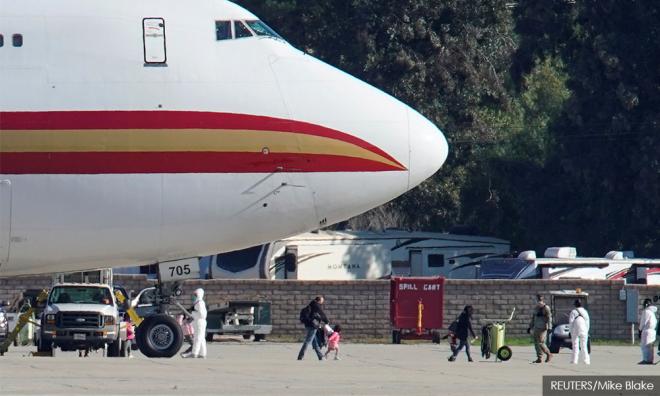
The experience of Japan in evacuating 206 citizens in Wuhan and then discovering three evacuees were positively tested with the novel coronavirus (2019-nCoV) on arrival, should give us all pause for thought on evacuating Malaysians there.
Especially in light of two of the positively-tested Japanese did not exhibit any symptoms at all of being infected by the lethal virus.
Moreover, as of today, the World Health Organisation has finally declared a global emergency over the deadly virus spreading from China.
Earlier with countries across the globe starting to evacuate their citizens from the epicentre of the epidemic, Malaysian decided to follow their footstep and preparing for a discussion with China for their evacuation.
According to the Malaysian ambassador to China, Raja Nushirwan Zainal Abidin, there are 82 Malaysians living in or surrounding Wuhan, and they are in good health.
The plan, as announced by Prime Minister Dr Mahathir Mohamed on Jan 29 was that the evacuees’ will be checked upon arrival, and if there is evidence that they have the coronavirus, or if they have been in Wuhan for a long time, they will be placed in quarantine (for 14 days) before being allowed to return home.
So far, none of the Malaysians in Wuhan has been reported to be infected by the disease.
In the latest twist to this development, the following day (Jan 30), Foreign Minister Saifuddin Abdullah said China has disallowed the use of Malaysian military aircraft to evacuate Malaysians trapped in China’s epidemic-stricken Hubei province and its capital city of Wuhan but allowed the use of commercial flights.
As such, the National Disaster Management Agency (Nadma) will bring 80 Malaysians home via a commercial flight as soon as possible.
Saifuddin also added that Nadma is ready for the mission, and he expected this would be done in two to three days’ time.
Of course, there is a compassionate dimension in bringing them back to Malaysia.
Besides being trapped due to the lockdown on the city by the Chinese authority in order to contain the virus, Malaysians in Wuhan are also reportedly facing food shortages.
As such, if Malaysia has to send a plane to China to evacuate its citizens, food, gloves and masks can also be sent to the people there because these things also face a shortage.
However, in light of the Japanese experience, should Malaysia risk the chance of bringing back infected patients or virus carrier from Wuhan?
How can we be sure that all of them are not infected?
The feature of this virus which differentiates it from the Severe Acute Respiratory Syndrome (Sars) virus is that infected people may not show any symptoms at all.
These positively-tested people with no symptoms are known as asymptomatic patients.
As long as they are not tested, they remain as unidentified virus carriers.
As of Jan 18, data shows that on average, a patient can spread the virus to 1.5 to 3.5 other people.
If there were ten asymptomatic people arriving in the commercial plane from Wuhan, there will be 15 to 35 other people to be infected in the future.
This is a slippery slope, but its severity is too critical for us to dismiss.
If we ever miss one patient during the check-up for quarantine, the consequences are to be borne by the entire nation.
Although our healthcare system is among the top in Asia, and so too our level of preparedness in containing a contagion, the presence of infected people with no symptoms is a game-changer as far as our readiness and preparedness are concerned.
The appearance of asymptomatic patients has made the job of containing the infection much harder than previously.
The government should not risk putting Malaysia in danger of the deadly epidemic.
As a practical measure, it is good to observe the Islamic perspective on epidemics.
The images of cities on lockdown, scanning travellers at airports and stations and empty streets can be scary.
But this is not new for Muslims. When it comes to highly contagious communicable diseases, Islam has given guidance.
Whilst they probably didn’t have 2019-CoV in the time of the Prophet Muhammad, they did have the plague.
And here’s what the Prophet enjoined the Muslims on what to do in a Hadith narrated by Bukhari: “If you hear about it (the plague) in a land that you are in, do not run away from it, and if you hear that it broke out in a certain land, do not enter that land.”
The second part of this Hadith is pretty obvious, but the first part is more difficult to realise because the natural response of a person confronted with a highly contagious disease is to run.
However, the Hadith is clear on not to run. What would motivate a person not to run?
The Prophet gave an incentive like no other. He said: “Plague was a punishment which Allah used to send on whom He wished, but Allah made it a blessing for the believers.
“None (among the believers) remains patient in a land in which plague has broken out and considers that nothing will befall him, except what Allah has ordained for him, but that Allah will grant him a reward similar to that of a martyr.” (Bukhari)
The reward of the shuhada (the martyrs) is amongst the greatest rewards of all in Islam and it is given to the one who is patient and does not leave the area of plague.
This is tied with Islamic concepts of tawaqqal (deep surrender to the will of Allah) and knowing that life and death lie solely in His hands.
The writers, Jamari Mohtar & Chia Chu Hang are members of Emir Research. - Mkini



No comments:
Post a Comment
Note: Only a member of this blog may post a comment.